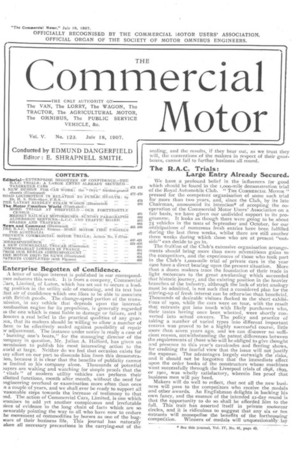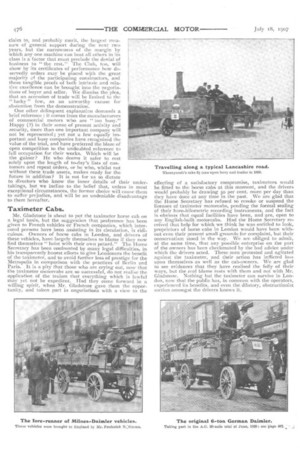Enterprise Begotten of Confidence.
Page 1

Page 2

If you've noticed an error in this article please click here to report it so we can fix it.
A letter of unique interest is published in our correspondnice columns this week. It is from a company, Commercial :ars, Limited, of Luton, which has set out to secure a leadrig position in the utility side of motoring, and its text has :hat air of confidence which one likes to be able to associate with British goods. The change-speed portion of the transfission, in any vehicle that depends upon the internal:ombustion engine for its propulsion, is generally regarded 3.s the one which is most liable to damage or failure, and it lenotes a real belief in the practical qualities of any gearox, that its makers should be willing to allow a number of hem to be effectively sealed against possibility of repair atadjustment. The instance under notice is really a case of burning one's boats," for the managing director of the )ompany in question, Mr. Julian A. Halford, has given us )errnission to publish his most interesting action to the world at large. Neither do we feel that occasion exists for my effort on our part to dissuade him from this demonstraion, because it is clear that the benefits of publicity cannot )e limited to his company alone. Thousands of potential )uyers are waiting and watching for simple proofs that the Vitals " of modern utility vehicles can perform their illotted functions, month after month, without the need for mgineering overhaul or examination more often than once n a couple of years, and we shall ever be ready to support all -easonable steps towards the increase of testimony to that Ind. The action of Commercial Cars, Limited, is one which }romises to add yet another conspicuous and irrefutable fiece of evidence to the long chain of facts which are so nexorably pointing the way to all who have now to endure he movement of commodities by horses as one of the bug)ears of their business life. This journal has naturally aken all necessary precautions in the carrying-out of the
We have a profound belief in the influences for good which should be found in the i,000-mile demonstration trial of the Royal Automobile Club. "THE COMMERCIAL MOTOR" pressed for the competent organisation of some such trial for more than two years, and, since the Club, by its late Chairman, announced its intention* of accepting the cooperation of the Commercial Motor Users' Association on a fair basis, we have given our undivided support to its programme. It looks as though there were going to be about 75 vehicles in the tests of September and October, for our anticipations of numerous fresh entries have been fulfilled during the last three weeks, whilst there are still another three weeks during which those who are at present "outside" can decide to go in.
The fruition of the Club's extensive organisation arrangements should bring more than mere adventitious gains to the competitors, and the experiences of those who took part in the Club's r,000-mile trial of private cars in the year 1900 have a direct bearing upon the present situation. More than a dozen makers trace the foundation of their trade in light motorcars to the great awakening which succeeded that historic journey, and the existing position in the heavier branches of the industry, although the lack of strict analogy must be admitted, is not such that a considered plan for the stirring-up of fresh interest can be otherwise than beneficial. Thousands of desirable visitors flocked to the short exhibitions of igoo, while the ears were on tour, with the result that entrants got into touch with likely purchasers who, their tastes having once been whetted, were shortly converted into actual owners. The policy and practice of taking a number of varied types into different important centres was proved to be a highly successful course, little more than seven years ago, and we can discover no sufficient reason, notwithstanding the patent differences between the requirements of those who will be obliged to give thought and presence to this year's cavalcades and fleeting shows, for crediting the fearful view that the issue will not justify the expense. The advantages largely outweigh the risks, and it should not be forgotten that the immediate effect upon the order books of the constructors whose machines went successfully through the Liverpool trials of 1898, 1899, or 1901, was wholly satisfactory, wherein lies proof that business men will pay heed.
Makers will do well to reflect, that not all the new business will pass to the competitors who receive the medals and other awards. An Englishman delights in backing his own fancy, and the essence of the intended 22-day round is that the opportunity to do so shall be afforded him to the full. This trait has asserted itself in private motorcar circles, and it is ridiculous to suggest that any six or ten entrants will monopolise the benefits of the forthconaingcompetition. Winners of medals will unquestionably lay claim to, and probably merit, the largest measure of general support during the next two years, but the narrowness of the margin by which any one machine can beat all others in its class is a factor that must preclude the denial of business to " the rest." The Club, too, will show by its certificates of performance how deservedly orders may be placed ‘Nr.th the great majority f the participating constructors, and these tangible proofs of both intrinsic and relative excellence can be brought into the negotiations of buyer and seller. We dismiss the plea, that an accession of trade will be limited to the " lucky " few, as an unworthy excuse for abstention from the demonstration.
One other delinquent explanation demands a brief reference : it comes from the manufacturers of commercial motors who are " too busy." Happy (?) in their sense of present activity and security, more than one important company will not be represented ; yet not a few equally important and busy companies have recognised the value of the trial, and have preferred the blaze of open competition to the undoubted reference to full occupation for their works. Which will be the gainer? He who deems it safer to rest solely upon the length of to-day's lists of customers and repeat orders, or he who, whilst not without these trade assets, makes ready for the future in addition? It is not for us to dictate to directors who know the inner details of their undertakings, but we incline to the belief that, unless in most exceptional circumstances, the former choice will cause them to suffer prejudice, and will be an undeniable disadvantage to them hereafter.
Taximeter Cabs.
Mr. Gladstone is about to put the taximeter horse cab on a legal basis, but the suggestion that preference has been given to French vehicles or French companies, which interested persons have been assisting in its circulation, is ridiculous. Owners of horse cabs in London, and drivers of these vehicles, have largely themselves to blame if they now find themselves " hoist with their own petard." The Home Secretary has been confronted by many legal difficulties, in his transparently honest efforts to give Londoners the benefit of the taximeter, and to avoid further loss of prestige for the Metropolis in comparison with the practices of Berlin and Paris. It is a pity that those who are crying out, now that the taximeter motorcabs are so successful, do not realise the application of the truism that everything which is lawful may yet not be expedient. Had they come forward in a willing spirit, when Mr. Gladstone gave them the opportunity, and taken part in negotiations with a view to the
effecting of a satisfactory compromise, taximeters would be fitted to the horse cabs at this moment, and the drivers would probably be drawing so per cent, more per day than they have done at any time in the past. We are glad that the Home Secretary has refused to revoke or suspend the licenses of taximeter motorcabs, pending the formal sealing of their hero-kilometric recording instruments, and the fact is obvious that equal facilities have been and are, open to any English-built motorcabs. Had the Home Secretary received that help for which we think he was entitled to look, proprietors of horse cabs in London would have been without even their present small grounds for complaint, but their conservatism stood in the way. We are obliged to admit, at the same time, that any possible enterprise on the part of the owners has been checkmated by the bad advice under which the drivers acted. These men protested and agitated against the taximeter, and their action has inflicted loss upon themselves as well as the cab-owners. We are glad to see evidences that they have realised the folly of their ways, but the real blame rests with them and not with Mr. Gladstone. Nothing but the taximeter can survive in London, now that the public has, in common with the operators, experienced its benefits, and even the dilatory, obstructionist section amongst the drivers knows it.


























